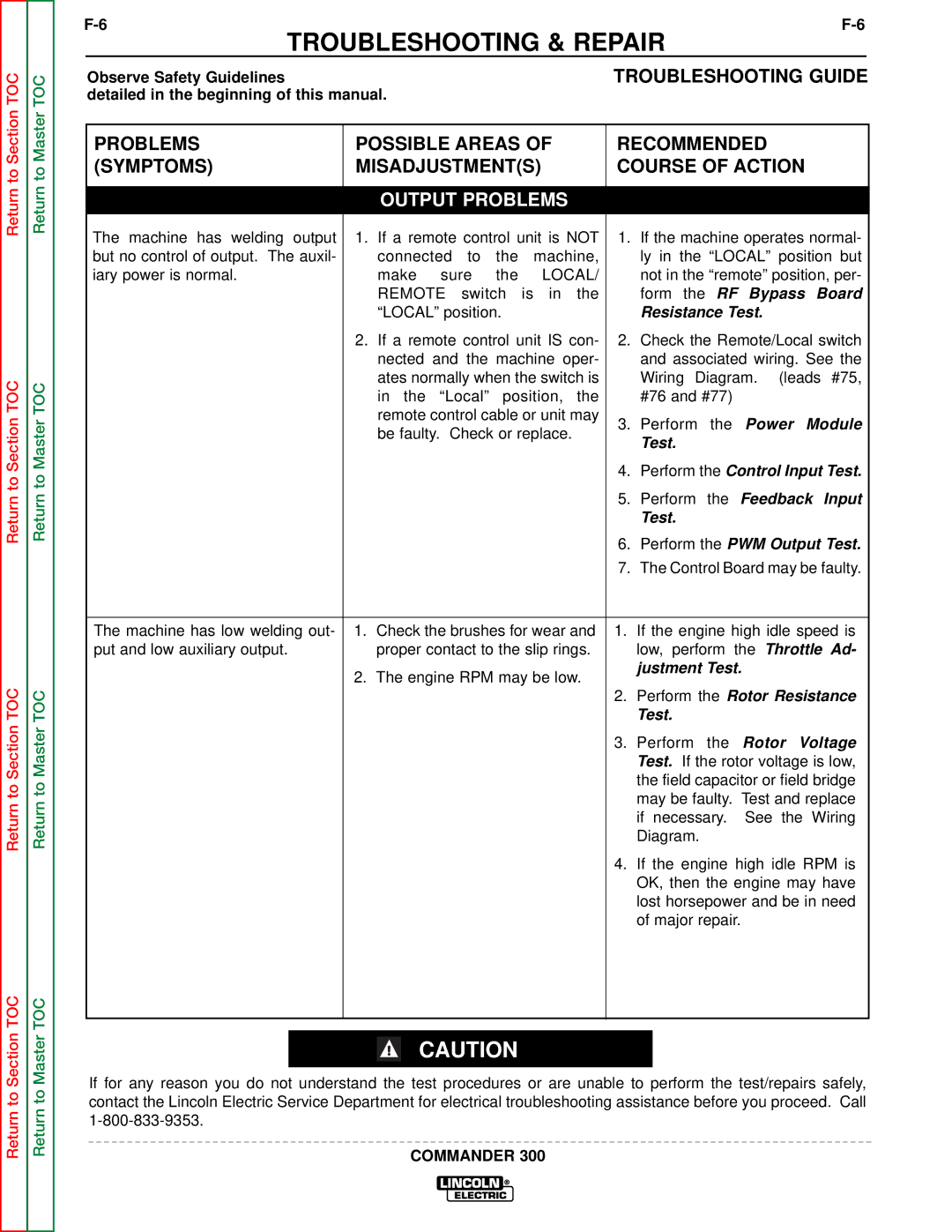
Return to Section TOC
Return to Section TOC
Return to Section TOC
Return to Section TOC
Return to Master TOC
Return to Master TOC
Return to Master TOC
Return to Master TOC
|
|
|
|
| ||||
| TROUBLESHOOTING & REPAIR |
| ||||||
| Observe Safety Guidelines |
|
|
|
| TROUBLESHOOTING GUIDE | ||
| detailed in the beginning of this manual. |
|
|
|
|
| ||
|
|
|
|
| ||||
| PROBLEMS | POSSIBLE AREAS OF | RECOMMENDED |
| ||||
| (SYMPTOMS) | MISADJUSTMENT(S) | COURSE OF ACTION |
| ||||
|
|
|
|
|
|
| ||
|
|
| OUTPUT PROBLEMS |
|
|
| ||
| The machine has welding output | 1. | If a remote control unit is NOT | 1. | If the machine operates normal- |
| ||
| but no control of output. The auxil- |
| connected to | the | machine, |
| ly in the “LOCAL” position but |
|
| iary power is normal. |
| make sure | the | LOCAL/ |
| not in the “remote” position, per- | |
|
|
| REMOTE switch is in the |
| form the RF Bypass Board | |||
|
|
| “LOCAL” position. |
|
| Resistance Test. | ||
|
| 2. | If a remote control unit IS con- | 2. | Check the Remote/Local switch | |||
|
|
| nected and the machine oper- |
| and associated wiring. See the | |||
|
|
| ates normally when the switch is |
| Wiring Diagram. (leads #75, | |||
|
|
| in the “Local” position, the |
| #76 and #77) | |||
|
|
| remote control cable or unit may | 3. | Perform the Power Module | |||
|
|
| be faulty. Check or replace. | |||||
|
|
|
| Test. | ||||
|
|
|
|
|
|
| ||
|
|
|
|
|
| 4. Perform the Control Input Test. | ||
|
|
|
|
|
| 5. Perform the Feedback Input | ||
|
|
|
|
|
|
| Test. | |
|
|
|
|
|
| 6. Perform the PWM Output Test. | ||
|
|
|
|
|
| 7. The Control Board may be faulty. | ||
|
|
|
|
|
| |||
| The machine has low welding out- | 1. Check the brushes for wear and | 1. | If the engine high idle speed is | ||||
| put and low auxiliary output. |
| proper contact to the slip rings. |
| low, perform the Throttle Ad- | |||
|
| 2. The engine RPM may be low. |
| justment Test. | ||||
|
|
|
|
| ||||
|
|
|
|
|
| 2. Perform the Rotor Resistance | ||
|
|
|
|
|
|
| Test. | |
|
|
|
|
|
| 3. Perform the Rotor Voltage | ||
|
|
|
|
|
|
| Test. If the rotor voltage is low, | |
|
|
|
|
|
|
| the field capacitor or field bridge | |
|
|
|
|
|
|
| may be faulty. Test and replace | |
|
|
|
|
|
|
| if necessary. See the Wiring | |
|
|
|
|
|
|
| Diagram. | |
|
|
|
|
|
| 4. If the engine high idle RPM is | ||
|
|
|
|
|
|
| OK, then the engine may have | |
|
|
|
|
|
|
| lost horsepower and be in need | |
|
|
|
|
|
|
| of major repair. | |
|
|
|
|
|
|
|
|
|
CAUTION
If for any reason you do not understand the test procedures or are unable to perform the test/repairs safely, contact the Lincoln Electric Service Department for electrical troubleshooting assistance before you proceed. Call
